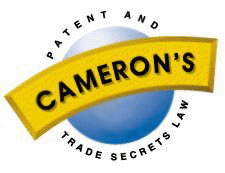
British United Shoe Machinery v.
Simon Collier
citation(s): (1909), 26 R.P.C. 21
 |
British United Shoe Machinery v.
|
copyright 1997 Donald M. Cameron, Aird & Berlis
At p. 49
"If, on the true construction of the Specification, the Claim is as wide as the Defendants contend, the validity of the Patent depends upon whether an inventor, who discloses one way of doing automatically for a particular purpose what, in existing machines, could be done for the same purpose, not, indeed, automatically, but by the exercise of skill on the part of the workman, can obtain the grant of Letters Patent for all means of doing the same thing automatically for the same purpose.
... though you cannot take out a Patent for a principle, yet if the principle is new, and you show one mode of carrying it into effect, you may protect yourself against all other modes of carrying the principle into effect. If, however, the principle is not new, you can only protect yourself against those modes of carrying it into effect which are substantially the same as the mode you have yourself invented ..."
Return to:
Cameron's IT Law: Home Page; Index
Cameron's Canadian Patent & Trade Secrets Law: Home Page; Index